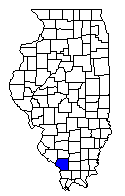
CHARLES EDWARD FEIRICH. A new but valued addition to the legal
fraternity in Carbondale, having been a resident of the city less than three
years at the time of this writing (1911), Charles Edward Feirich has already
made his mark in large and enduring phrase in professional circles in this
part of Illinois, and won the regard of the people as a man and a citizen.
He has been unostentatious in his course, and whatever he has achieved in
the way of reputation in general and standing at the bar is based on
demonstrated merit, substantial attainments, creditable work and genuine
worth.
Mr. Feirich is a native of Buffalo, New York, where his life
began on November 1, 1886. In that city his father, Charles A. Feirich, is a
prosperous carpenter, and during the minority of the son maintained his
wife, whose maiden name was Anna Kreinbring, and their offspring in modest
but real comfort, and gave his children all the educational advantages he
was able to provide for them, doing all in his power to open to them the way
to a better condition in life than he enjoyed himself.
One of the
children at least, Charles Edward, the only one of whom we have knowledge,
responded to the parental solicitude with every power at his command,
determined that no lack of effort on his part should defeat his father's
designs and ardent desires. He received a high school education in Buffalo,
which he supplemented with more advanced instruction at the Metropolitan
Select School, and throughout his course from the beginning strained every
nerve to make the best use of his opportunities. After completing his
academic training he studied law in the law department of Lake Forest
University, and was admitted to the bar in December, 1904. With the world
open to him for choice of a place in which to begin his practice and build
his professional career, he deemed the great metropolis and commercial
center of the Middle West the most attractive, and located "in among its
throngs of men." He soon afterward became connected with the legal
department of the Illinois Central Railroad as secretary to the road's chief
counsel, Judge J. M. Dickinson.
In this excellent field of operation
and school of broad practical development Mr. Feirich remained five years,
gathering light from the great luminaries of the legal firmament with whom
he came in contact from day to day, all the while extending his knowledge of
the law and of human nature, and improving his opportunities for making
acquaintances among men of large mold, superior endowments and comprehensive
attainments. His advantages were exceptional, it is true, but they would
have been of no benefit to him if he had not been of the caliber to fully
appreciate and properly use them, and assimilate the mental and professional
pabulum they furnished in such abundance and high quality.
In 1909
he moved to Carbondale, eager to stand on his own footing and work his own
way forward without the assistance of adventitious circumstances, and in
July of the following year formed a partnership with W. W. Barr, under the
firm name of Barr & Feirich. Mr. Feirich is the local attorney for the
Illinois Central Railroad Company, in Jackson county, and the firm
represents a number of banks, corporations and other fiscal, commercial and
industrial institutions. It stands in the front rank at the bar in Southern
Illinois, and its members have amply shown that it belongs there.
On
June 11, 1907, Mr. Feirich was united in marriage with Miss Jennie Cottrill,
of Buffalo, New York, a daughter of John J. Cottrill, one of the leading
teaming contractors in that great and striding city on the lakes. Two
children have been born in the Feirich household, both sons, Charles
Cottrill and John Kenneth. The parents belong to the Methodist Episcopal
church, and the father is a member of the board of stewards of the
congregation in which they hold membership. In fraternal circles he is
allied with the Masonic order and the Order of Odd Fellows. He is as zealous
in his attention to the interests of these fraternities as his professional
duties will allow him to be, fully appreciating their value as moral and
social agencies in the community, and his membership is highly appreciated
in each.
Extracted 15 Jan 2018 by Norma Hass from 1912 A History of Southern Illinois, volume 2, pages 816-817.
Randolph |
Perry | Franklin |
Perry MO |
 |
Williamson |
| Union |


